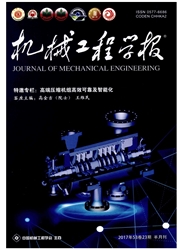

 中文摘要:
中文摘要:
针对制造过程中产品特征和控制特征偏差沿工位不断传递和累积影响了最终产品质量,提出基于敏感度分析的多工位制造系统工位设计布置评价方法。将工位参数代替时间参数,对多工位制造系统进行状态空间建模,建立了关键控制特征点的偏差传递和累积以及对关键产品特征点影响的系统化模型。提出三级层次敏感度指标(元件级/工位级/系统级),全面描述关键特征点的相互影响和不同的工位设计布置对偏差传递的作用。根据敏感度分析计算结果,提出了设计评价改进流程,以选择最优的系统设计方案,识别关键工位及确定单个最大的元件级偏差源。通过实例验证了评价指标和分析方法的有效性和可行性。
 英文摘要:
英文摘要:
Variations of the product characteristics and control characteristics propagate and accumulate along the stations in a multi-station manufacturing system, which may have a significant impact on the final product quality. An innovative methodology of sensitivity-based station design and configuration evaluation is thus proposed. In order to address the key control characteristics' variation propagation and accumulation as well as their impacts upon the key product characteristics, a state space model of the system is formulated, while replacing the time index with the station index. A sensitivity-based analytical method and a three level hieratical model (component, station, and system) are employed for fully characterizing the interdependencies of the key characteristics, as well as the relationship between different station design configurations and variation propagation and accumulation. Based on these indices, a flow chart of the evaluation and improvement procedures is presented for selecting a better design configuration, prioritizing the critical station and component in terms of variation control. An example is given to demonstrate the effectiveness and feasibility of the proposed indices and the analytical procedures.
 同期刊论文项目
同期刊论文项目
 同项目期刊论文
同项目期刊论文
 期刊信息
期刊信息
